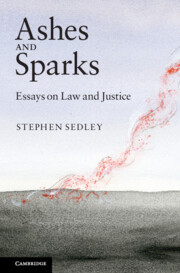Book contents
- Frontmatter
- Contents
- Preface
- Acknowledgements
- PART I History
- PART II Law
- PART III Justice
- 24 The right to know
- 25 The moral economy of judicial review
- 26 Policy and law
- 27 Responsibility and the law
- 28 The Crown in its own courts
- 29 Human rights – who needs them?
- 30 Fundamental values – but which?
- 31 Overcoming pragmatism
- 32 Sex, libels and video-surveillance
- 33 This beats me
- 34 Public inquiries: a cure or a disease?
- 35 Human rights: a twenty-first century agenda
- 36 Are human rights universal, and does it matter?
- 37 Bringing rights home: time to start a family?
- 38 The four wise monkeys visit the marketplace of ideas
- Index
38 - The four wise monkeys visit the marketplace of ideas
Published online by Cambridge University Press: 05 June 2012
- Frontmatter
- Contents
- Preface
- Acknowledgements
- PART I History
- PART II Law
- PART III Justice
- 24 The right to know
- 25 The moral economy of judicial review
- 26 Policy and law
- 27 Responsibility and the law
- 28 The Crown in its own courts
- 29 Human rights – who needs them?
- 30 Fundamental values – but which?
- 31 Overcoming pragmatism
- 32 Sex, libels and video-surveillance
- 33 This beats me
- 34 Public inquiries: a cure or a disease?
- 35 Human rights: a twenty-first century agenda
- 36 Are human rights universal, and does it matter?
- 37 Bringing rights home: time to start a family?
- 38 The four wise monkeys visit the marketplace of ideas
- Index
Summary
The Republic of Ireland seemed a good place to consider the role of censorship in a free society, which is what I did in the Law Society of Ireland's 2009 human rights lecture, having pre-cycled it at the Canadian judiciary's biennial Cambridge seminar.
The sense of liberality and tolerance which is everywhere in the Republic, and the prominence given to human rights in its constitutional law and practice, contrast not only with its history of religious censorship but with the novel blasphemy law which the Dail had just enacted. But then freedom of expression is itself shot through with paradoxes and, as the essay suggests, censorship is not the preserve of reactionaries.
Just as concerning, however, is the issue to which the later part of the paper turns – the falsification or ignoring of fact in the media. I argue here that this is another form of censorship, practised by the very sector of society which ought to have the highest regard for truth.
On 3 May 1817 William Hone was arrested at the corner of Fleet Lane and Old Bailey, in the City of London, by two constables armed with a warrant issued by the Chief Justice, Lord Ellenborough, and backed for bail in an impossible sum. He was charged with having published three blasphemous libels, John Wilkes's Catechism, The Political Litany and The Sinecurist's Creed.
- Type
- Chapter
- Information
- Ashes and SparksEssays On Law and Justice, pp. 391 - 406Publisher: Cambridge University PressPrint publication year: 2011



